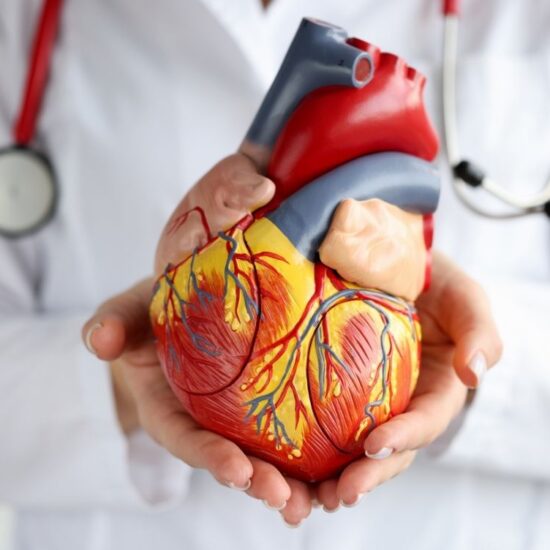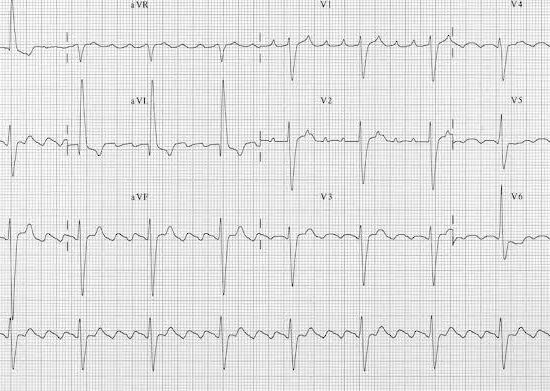What is Atrial Fibrillation and What are its Symptoms?
Atrial fibrillation (AFib) is an irregular, often very fast heart rhythm. An irregular heart rhythm is called an arrhythmia. AFib can lead to blood clots in the heart. This condition also increases the risk of stroke, heart failure, and other heart-related complications.
During atrial fibrillation, the upper chambers of the heart — the atria — beat chaotically and irregularly. They beat out of sync with the lower heart chambers, called the ventricles. For many people, AFib may have no symptoms. But AFib can cause a fast, pounding heartbeat, shortness of breath, or dizziness.
Atrial fibrillation attacks can come and go or be permanent. AFib itself is usually not life-threatening, but it is a serious medical condition that requires appropriate treatment to prevent stroke.
Treatment for atrial fibrillation may include medications, shock therapy to return the heart to a normal rhythm, and procedures to block the faulty heart signals.
A person with atrial fibrillation may also have a related heart rhythm problem called atrial flutter. Treatments for AFib and atrial flutter are similar.
Symptoms
Symptoms of AFib may include:
- A feeling of rapid, fluttering or pounding heartbeat called palpitations.
- Chest pain.
- Dizziness.
- Burnout.
- Dizziness.
- Decreased ability to exercise.
- Shortness of breath.
- Weakness.
Some people with atrial fibrillation (AFib) have no symptoms.
Atrial fibrillation can occur as follows:
- A rare condition also called paroxysmal atrial fibrillation.AFib symptoms come and go. Symptoms usually last from a few minutes to hours. For some people, symptoms can last as long as a week. Attacks can occur repeatedly. Symptoms may go away on their own. Some people with occasional AFib need treatment.
- Insistent.An irregular heartbeat is constant. The heart rhythm does not reset on its own. If symptoms occur, medical treatment is needed to correct the heart rhythm.
- Long-term permanent.This type of AFib is stable and lasts longer than 12 months. Medicines or a procedure are needed to correct the irregular heartbeat.
- Permanent.In this type of atrial fibrillation, it is not possible to reset the irregular heart rhythm. Medicines are needed to control the heart rate and prevent blood clots.
When should I see a doctor?
If you have symptoms of atrial fibrillation, make an appointment for a checkup. You may be referred to a doctor who is trained in heart disease, called a cardiologist.
If you have chest pain, seek immediate medical attention. Chest pain could mean you are having a heart attack.
Reasons
To understand the causes of atrial fibrillation (AFib), it can be helpful to know how the heart normally beats.
The heart has four chambers:
- The upper two chambers are called atria.
- The lower two chambers are called ventricles.
Inside the upper right heart chamber is a group of cells called the sinus node. The sinus node produces the signals that initiate each heartbeat.
Signals travel through the upper heart chambers. The signals then reach a group of cells called the AV node, where they usually slow down. The signals then travel to the lower heart chambers.
In a healthy heart, this signaling process usually goes smoothly. A resting heart rate is usually between 60 and 100 beats per minute.
But in atrial fibrillation, the signals in the upper chambers of the heart are chaotic. As a result, the upper chambers quiver or shake. The AV node is flooded with signals trying to reach the lower heart chambers. This causes a fast, irregular heart rhythm.
In people with AFib, the heart rate can range from 100 to 175 beats per minute.
Causes of atrial fibrillation
Problems with the structure of the heart are the most common cause of atrial fibrillation (AFib).
Heart conditions and health problems that can cause AFib include:
- A heart condition that is present at birth is called congenital heart disease.
- A problem with the heart’s natural pacemaker called sick sinus syndrome.
- A sleep disorder called obstructive sleep apnea.
- Heart attack.
- Heart valve disease.
- Hypertension.
- Lung diseases, including pneumonia.
- Narrowing or blockage of the arteries called coronary artery disease.
- Thyroid diseases such as overactivity of the thyroid gland.
- Viral infections.
Heart surgery or stress from surgery or illness also can cause AFib. Some people with atrial fibrillation have no known heart disease or heart damage.
Lifestyle habits that can trigger AFib attacks may include:
- Consuming too much alcohol or caffeine.
- Illicit drug use.
- Smoking or using tobacco.
- Use of medications containing stimulants, including over-the-counter cold and allergy medications.
Risk factors
Things that can increase your risk of atrial fibrillation (AFib) include:
- Age: The risk of AFib increases with age.
- Use of caffeine, nicotine, or illicit drugs:Caffeine, nicotine and some illegal drugs, such as amphetamines and cocaine, can cause your heart to beat faster. Use of these substances can lead to the development of more serious arrhythmias.
- Drinking too much alcohol:Drinking too much alcohol can affect the electrical signals in your heart, which can increase your risk of atrial fibrillation.
- Changes in body mineral levels:Minerals in the blood called electrolytes — such as potassium, sodium, calcium and magnesium — help the heart beat. If these substances are too low or too high, irregular heartbeats can occur.
- Family history:An increased risk of atrial fibrillation occurs in some families.
- Heart problems or heart surgery:Coronary artery disease, heart valve disease, and heart problems present at birth increase the risk of AFib. A history of heart attack or heart surgery also increases a person’s chance of developing the condition.
- High blood pressure:High blood pressure increases your risk of developing coronary artery disease. Over time, high blood pressure can cause part of the heart to harden and thicken. This can change how heartbeat signals travel through the heart.
- Obesity:People with obesity have a higher risk of developing atrial fibrillation.
- Other long-term health problems:You may be more likely to have AFib if you have diabetes, chronic kidney disease, lung disease, or sleep apnea.
- Some medications and supplements:Some prescription medications and some over-the-counter cough and cold medications can cause irregular heartbeats.
- Thyroid disease:An overactive thyroid gland can increase the risk of irregular heartbeat.
Complications
Blood clots are a dangerous complication of atrial fibrillation (AFib). Blood clots can lead to stroke.
The risk of stroke from AFib increases as you get older. Other health problems can also increase the risk of stroke from AFib. These problems include:
- Hypertension.
- Diabetes.
- Heart failure.
- Some heart valve diseases.
People with atrial fibrillation are often prescribed blood-thinning medications to prevent blood clots and strokes.
Prevention
Healthy lifestyle choices can reduce the risk of heart disease and prevent atrial fibrillation (AFib). Here are some basic heart health tips:
- Control high blood pressure, high cholesterol and diabetes.
- Do not smoke or use tobacco products.
- Follow a diet low in salt and saturated fat.
- Exercise at least 30 minutes a day, most days of the week, unless your healthcare team tells you otherwise.
- Get plenty of sleep. Adults should aim for 7 to 9 hours of sleep per night.
- Maintain a healthy weight.
- Reduce and manage stress.
Diagnosis
You may not know you have atrial fibrillation (AFib). It may be found during a health check for another reason.
To diagnose AFib, your health care provider will examine you and ask questions about your medical history and symptoms. Tests may be done to look for conditions that can cause irregular heartbeats, such as heart disease or thyroid disease.
Tests
Tests that may be done to diagnose atrial fibrillation (AFib) include:
- Blood tests:Blood tests are done to look for health conditions or substances that can affect the heart or heartbeat.
- Electrocardiogram (ECG or EKG):This quick, painless test measures the electrical activity of the heart. Adhesive patches called electrodes are placed on the chest and sometimes the arms and legs. Wires connect the electrodes to a computer that prints or displays the test results. An ECG can show the heart rhythm and how fast or slow the heart is beating. It’s the main test used to diagnose atrial fibrillation.
- Holter monitor:This small, portable ECG device records your heart’s activity and is worn for a day or two while you do your regular activities.
- Event recorder:This device is similar to a Holter monitor, but it only records for a few minutes at a time. It’s usually worn for about 30 days. You usually press a button when you feel symptoms. Some devices automatically record when an irregular heart rhythm is detected.
- Implantable loop recorder:This device records your heartbeat continuously for up to three years. It’s also called a cardiac event recorder. It shows how your heart beats as you go about your daily activities. It can be used to see how often you have AFib attacks. It’s sometimes used to find rare AFib attacks in people who are at high risk of heart problems. For example, you might need one if you’ve had an unexplained stroke.
- Echocardiogram:Sound waves are used to create images of your beating heart. This test can show how blood flows through your heart and heart valves.
- Exercise stress tests:These tests usually involve walking on a treadmill or pedaling a stationary bike while your heart is monitored. The tests show how your heart responds to exercise. If you can’t exercise, you may be given medications that increase your heart rate as exercise does. Sometimes an echocardiogram is done during a stress test.
- Chest X-ray:A chest X-ray shows the condition of the lungs and heart.
Treatment
The goal of atrial fibrillation treatment is to reset and control the heart rate and prevent blood clots.
Treatment depends on:
- How long have you had AFib?
- Your symptoms.
- Cause of irregular heartbeat.
Treatment for atrial fibrillation may include:
- Medicine.
- Treatment to reset the heart rhythm is called cardioversion.
- Surgery or catheter procedures.
Together, you and your healthcare team will discuss the best treatment option for you. It’s important to follow your atrial fibrillation treatment plan. If AFib isn’t well controlled, it can lead to other complications, including stroke and heart failure.
Medicines
Treatment for atrial fibrillation may include medications that:
- Check heart rate.
- Restore heart rhythm.
- Prevent blood clots, a dangerous complication of AFib.
Medicines that can be used include:
- Beta blockers.These medications help slow down the heart rate.
- Calcium channel blockers.These medications control heart rate, but those with heart failure or low blood pressure may need to avoid them.
- Digoxin.This medication can control heart rate at rest, but not as well during activity. Most people need additional or alternative medications, such as calcium channel blockers or beta blockers.
- Medicines that control heart rate and rhythm.These types of medications, also called antiarrhythmics, are rarely used. They tend to have more side effects than other drugs that control heart rate.
- Blood thinners.These medications, also called anticoagulants, help prevent blood clots and reduce the risk of stroke. Blood thinners include warfarin (Jantoven), apixaban (Eliquis), dabigatran (Pradaxa), edoxaban (Savaysa) and rivaroxaban (Xarelto). If you take warfarin, you’ll need regular blood tests to monitor the effects of the medication.
Cardioversion therapy
If atrial fibrillation symptoms are bothersome or this is your first episode of AFib, your doctor may try to reset your heart rhythm using a procedure called cardioversion.
Cardioversion can be performed in two ways:
- Electrical cardioversion.The method of resetting the heart rhythm is done by sending an electric shock to the heart through paddles or bands placed on the chest.
- Medicated cardioversion.Medications given intravenously or orally are used to reset the heart rhythm.
Cardioversion is usually done as a planned procedure in the hospital. However, it can also be done in an emergency setting. If it is planned, you may need to take a blood thinner, such as warfarin (Jantoven), for several weeks before the procedure. The medication reduces the risk of blood clots and stroke.
After electrical cardioversion, medications to control heart rhythm may be needed for life to prevent future episodes of atrial fibrillation. Even with medication, AFib can return.
Surgery or catheter procedures
If AFib doesn’t improve with medications or other treatments, a procedure called cardiac ablation may be needed. Sometimes ablation is the first treatment.
Cardiac ablation usually uses heat or cold energy to create small wounds in the heart. The wounds disrupt irregular heart signals and restore a typical heartbeat. A doctor inserts a flexible tube called a catheter, usually from your groin, through a blood vessel and into your heart. More than one catheter may be used. Sensors at the end of the catheter apply the cold or heat energy.
Less commonly, ablation is performed using a scalpel during open-heart surgery.
There are several types of cardiac ablation. The type used to treat atrial fibrillation depends on your specific symptoms, your overall health, and whether you’ve had other heart surgery.
- Atrioventricular (AV) node ablation:Heat energy is usually applied to destroy the electrical signaling connection to the heart tissue in the AV node. A pacemaker is required for life after this treatment.
- Maze procedure:A doctor uses heat or cold energy or a scalpel to create a pattern, or labyrinth, of scar tissue in the upper chambers of the heart. Scar tissue doesn’t send electrical signals, so the labyrinth interferes with the stray heart signals that cause atrial fibrillation.
If a scalpel is used to create the labyrinth pattern, open-heart surgery is required. This is called a surgical labyrinth procedure. It is the preferred treatment for AFib in those who need another heart surgery, such as coronary artery bypass surgery or heart valve repair. - Hybrid atrial fibrillation ablation:This therapy combines ablation with surgery. It is used to treat long-term persistent atrial fibrillation.
- Pulsed field ablation:This is a treatment for some types of permanent atrial fibrillation. It doesn’t use heat or cold energy. Instead, it uses high-energy electrical pulses to create areas of scar tissue in the heart. The scar tissue blocks the faulty electrical signals that cause AFib.
Atrial fibrillation can return after cardiac ablation. If this happens, another ablation or heart treatment may be recommended. After cardiac ablation, you may need to take blood thinners for life to prevent strokes.
If you have AFib but can’t take blood thinners, you may need a procedure to close a small sac in the upper left heart chamber. This sac, called the appendix, is where most clots associated with AFib form. This procedure is called left atrial appendage closure. A closure device is gently guided into the sac through a catheter. Once the device is in place, the catheter is removed. The device remains in place permanently. Surgery to close the left atrial appendage is also an option for some people with AFib who have had other heart surgery.
Lifestyle and home remedies
Adopting a heart-healthy lifestyle can help prevent or treat conditions that can lead to atrial fibrillation (AFib). The following changes are recommended to improve heart health:
- Eat healthy foods:Choose plenty of fruits, vegetables, and whole grains. Limit sugar, salt, and saturated fats.
- Exercise and stay active:Regular physical activity helps control diabetes, high cholesterol and high blood pressure — all risk factors for heart disease. Try to get 30 to 60 minutes of physical activity most days of the week. Talk to your health care team about the amount and type of exercise that’s best for you.
- Do not smoke:Smoking is a major risk factor for heart disease. If you need help quitting, talk to your healthcare team.
- Maintain a healthy weight:Being overweight increases your risk of heart disease. Talk to your care provider to set realistic goals for your weight.
- Check blood pressure:If you’re 18 or older, have your blood pressure checked at least every two years. If you have risk factors for heart disease or are over 40, you may need more frequent checks. If you have high blood pressure, follow your treatment plan as directed.
- Get your cholesterol measured:Ask your healthcare team how often you need cholesterol testing. Lifestyle changes and medications may be recommended to control high cholesterol.
- Limit alcohol:Binge drinking (five drinks in two hours for men or four drinks in two hours for women) can increase the risk of atrial fibrillation. In some people, even smaller amounts of alcohol can trigger AFib.
- Practice good sleep habits:Poor sleep can increase the risk of heart disease and other chronic conditions. Adults should aim for 7 to 9 hours of sleep per day.
Getting ready for your appointment
If you have an irregular or pounding heartbeat, make an appointment for a checkup. If AFib is found early, treatment can be easier and have better results. You may be referred to a doctor trained in heart disease. This type of provider is called a cardiologist.
Here’s some information to help you prepare for your appointment:
What can you do?
- Please note the following pre-appointment restrictions:When you make your appointment, ask if there’s anything you need to do in advance, such as restrict your diet. For example, you may be told not to eat or drink anything for a few hours before your cholesterol test.
- Write down any symptoms you are experiencing:including those that may seem unrelated to atrial fibrillation. Note when they started and what you were doing when they started.
- Enter your important personal information:Including whether there is a family history of heart disease, stroke, high blood pressure or diabetes, and any recent major stresses or life changes.
- Make a list of all medications:Any vitamins or supplements you take — even those purchased over the counter. Include dosages.
- If possible, take someone with you:Someone accompanying you can help you remember the information given to you.
- Write down the questions:to ask your healthcare team.
For atrial fibrillation, some basic questions to ask your doctor include:
- What is likely causing my symptoms or condition?
- What are other possible causes of my symptoms or condition?
- What tests will I need?
- Which is the most appropriate treatment?
- Is there a generic alternative to the medication you prescribed?
- What are other treatment options?
- What foods should I eat or avoid?
- What is an appropriate level of physical activity?
- Are there any other restrictions I need to follow?
- How often should I be screened for heart disease or complications of AFib?
- I have other health issues. How can I best manage them together?
- Should I see a specialist?
- Are there any brochures or other printed materials I can take home? What websites do you recommend I visit?
Feel free to ask any other questions you may have during your appointment.
What should you expect from your doctor?
During a checkup, you’ll typically be asked a number of questions. Being prepared to answer these questions can save you time looking into details you want to spend more time on. You may be asked:
- When did your symptoms start?
- Do your symptoms occur all the time, or do they come and go?
- How severe are your symptoms?
- Is there anything that improves your symptoms?
- Is there anything that makes your symptoms worse?
What can you do in the meantime?
It’s never too early to make heart-healthy lifestyle changes, such as quitting smoking, eating healthy foods, and getting more exercise. A healthy lifestyle is a key protection against heart problems and heart-related complications.






